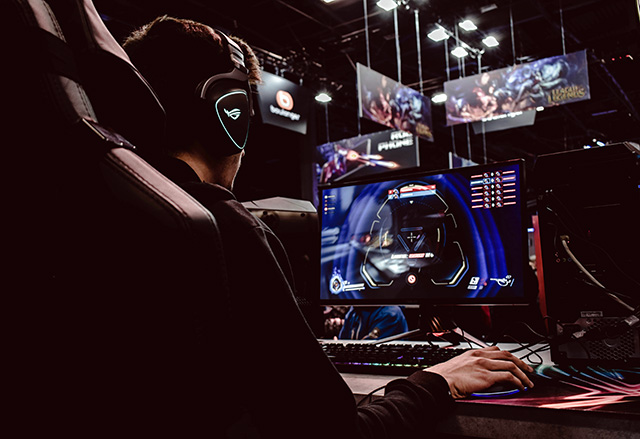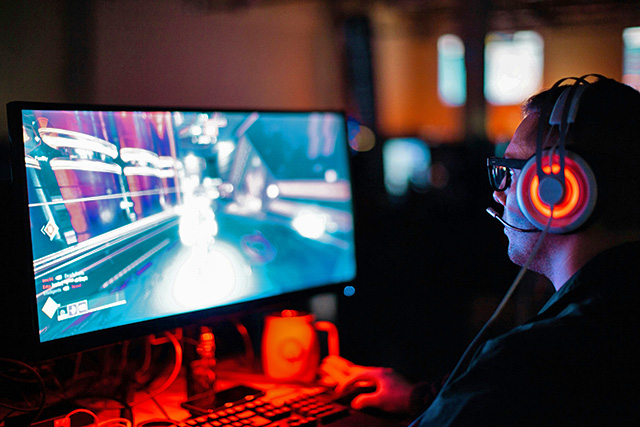Is Esports a Sport? This article will explore why esports should be considered legitimate, emphasizing its rightful place alongside traditional sports.
International sporting bodies increasingly acknowledge the validity of esports due to the considerable skill, strategic acumen, and intensive training it demands—many advocate for recognizing that esports is a genuine form of sport in every sense.
 e-sport gaming competitor
e-sport gaming competitorDefining Esports and Traditional Sports
Within the unfolding digital era, esports has emerged as a revolutionary sphere of competition that transcends geographical divides. Unlike traditional sports, which are rooted in the physical world with specific playing environments such as courts and fields, esports take place within virtual settings where these digital realms serve as arenas for achieving triumph.
Yet at their essence, both worlds strive for peak performance through skillful play, tactical prowess, and collaborative spirit.
Both esports and conventional sports rest upon an organized infrastructure to foster fair play and evenhandedness among participants. Esports systems are crafted meticulously to uphold this fairness.
Hence, equitable conditions for competitors are provided. Teams operating in esports invest deeply in strategies like those associated with classic sports teams but focus on sharpening cognitive speed over physical force.
Esports has many similarities with sports, in addition to teams and championships, rankings also work in many of these games such as CS2 Premier ranks and other major esports
The variety of acclaimed games within the domain of professional competitive gaming is broad-ranging and ever-changing. These games engage players’ intellects as well as or better than their reaction times across different genres, from strategy-driven contests to fast-paced shooter scenarios, each demanding distinctive abilities along with coordinated team efforts.
The Skill and Strategy Involved in Esports
The pulse-pounding domain of esports stands as a shining example of how competitive video gaming is a battle not just of the hands but also of the mind. Within this arena, esports athletes must exhibit:
- incredibly swift reaction times
- deep tactical foresight
- deliberate strategies in real-time strategy games
- instantaneous judgment calls in fighting games
Victory in this field hinges on an athlete’s ability to blend nimble thinking with even nimbler reflexes.
At the core of first-person shooters is an emphasis on precision and collaborative tactics. Here, teams synchronize their gameplay with extraordinary detail, akin to orchestral harmony, to defeat foes.
In the compelling realm of MOBAs (Multiplayer Online Battle Arenas), another dimension exists where squads are tasked with mastering intricate hero skills and shifting combat scenarios.
Such refined skill sets among professional esports players stem from intensive training schedules aimed at perfecting consistency and sharpening accuracy—traits that distinguish elite competitors in grandiose tournaments and more intimate events throughout the esports landscape.
Physical Demands of Competitive Gaming
Contrary to popular belief, competitive gaming in esports is not just a mental challenge but also places significant physical demands on players. The stamina of an esports player can be rigorously tested during long periods of play, which may lead to discomfort or pain in the hands, wrists, and fingers. This necessitates adopting regular physical activity as part of their regimen to maintain top performance levels.
Professional esports athletes have taken cues from traditional sports by implementing practices such as warm-up exercises, and cooldown stretches specific to hand movements, aiming to reduce injury risks. These preventative measures reflect similar efforts among athletes engaged in real sports where maintaining optimal conditions is crucial.
Playing video games at a competitive level affords benefits that include superior hand-eye coordination, improved spatial abilities, and sustained concentration—skills comparable with those developed through conventional sports activities.
Far from casual pastime outcomes alone, these competencies are cultivated deliberately over time, contributing significantly to faster reaction times and enhanced strategic understanding, which is crucial for elite esports competitors.
Recognition of Esports by Sporting Bodies
 e-sport gaming competitior
e-sport gaming competitiorThe rapid rise of electronic sports into recognized sporting events' echelons is impressive and swift. Countries like China have been at the forefront, embracing video game competitions as a serious form of competition and, according to esports, official status as a real sport. Similarly, in acknowledging professional gamers' skill level and legitimacy, the United States has started issuing P-1 visas to esports athletes—visas typically reserved for traditional professional athletes.
Organizations such as Korea’s e-Sports Association (KeSPA) have integrated themselves within national sports systems, solidifying the standing of esports alongside established sports within collegiate athletics and beyond.
The International Olympic Committee (IOC), while proceeding with caution, has shown an openness to including those video games that reflect its values—aesthetic consistency with other sports—as exemplified by titles like NBA 2K and FIFA.
There remain obstacles on the road to full recognition. Concerns from entities like the IOC about violent content in certain games highlight challenges in merging esports into conventional competitive event structures due to the lack of one universally accepted regulatory body for e-sports globally, revealing complexities surrounding this integration effort.
Ensuring transparent governance and setting definitive guidelines will be crucial for advancing maturity in the e-sports industry so it might earn uniform acceptance across various platforms comparable in stature to more established athletic contests.
Economic Impact of Esports
The financial landscape of electronic sports is characterized by remarkable expansion and potential, with forecasts predicting the sector to soar to a value of $4.5 billion by 2023.
The video game industry and its competitive branches have demonstrated considerable profitability as an emerging market niche. Sponsorships are a critical revenue source for this sector, making up a substantial share of the earnings and driving the economic surge.
Commercial interests are increasingly gravitating towards esports events due to their ability to generate income through ticket purchases and merchandise sales—a testimony to the growing community’s readiness to support what they love financially.
Media rights revenues have climbed significantly, thanks in part to lucrative broadcasting contracts with platforms such as Twitch and YouTube Gaming, which underscore these events’ widespread appeal.
In pursuit of a sustainable commercial structure, esports entities are diversifying beyond sponsorships by solidifying media rights agreements—a more effective strategy than traditional advertising models used in conventional sports settings because it engages audiences more effectively. This suggests that we could see esports redefine prevailing marketing techniques within the business sphere moving forward.
When examining how different regions contribute economically within this domain, Asia emerges prominently at the forefront in terms of economic development.
Related Pages
- Discussion about what is a sport?
- List of questionable sports
- Should eSports Games Be Realistic? not everyone wants it that way.
- All About esports


 Current Events
Current Events